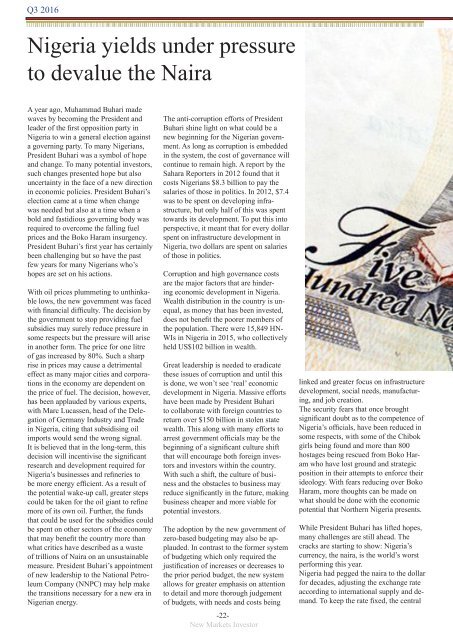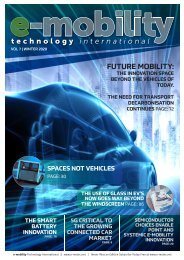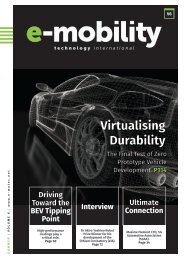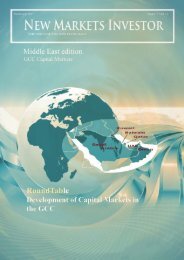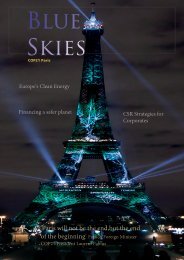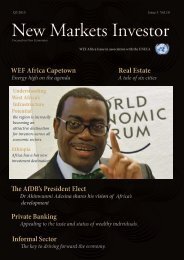Q4 2018 New Markets Investor
The magazine targets an audience of corporate and private investors, but its lucid voice makes it intelligible and essential reading for anybody who wants to understand investment strategies and markets in the 21st century.
The magazine targets an audience of corporate and private investors, but its lucid voice makes it intelligible and essential reading for anybody who wants to understand investment strategies and markets in the 21st century.
Create successful ePaper yourself
Turn your PDF publications into a flip-book with our unique Google optimized e-Paper software.
Q3 2016<br />
Nigeria yields under pressure<br />
to devalue the Naira<br />
A year ago, Muhammad Buhari made<br />
waves by becoming the President and<br />
leader of the first opposition party in<br />
Nigeria to win a general election against<br />
a governing party. To many Nigerians,<br />
President Buhari was a symbol of hope<br />
and change. To many potential investors,<br />
such changes presented hope but also<br />
uncertainty in the face of a new direction<br />
in economic policies. President Buhari’s<br />
election came at a time when change<br />
was needed but also at a time when a<br />
bold and fastidious governing body was<br />
required to overcome the falling fuel<br />
prices and the Boko Haram insurgency.<br />
President Buhari’s first year has certainly<br />
been challenging but so have the past<br />
few years for many Nigerians who’s<br />
hopes are set on his actions.<br />
With oil prices plummeting to unthinkable<br />
lows, the new government was faced<br />
with financial difficulty. The decision by<br />
the government to stop providing fuel<br />
subsidies may surely reduce pressure in<br />
some respects but the pressure will arise<br />
in another form. The price for one litre<br />
of gas increased by 80%. Such a sharp<br />
rise in prices may cause a detrimental<br />
effect as many major cities and corporations<br />
in the economy are dependent on<br />
the price of fuel. The decision, however,<br />
has been applauded by various experts,<br />
with Marc Lucassen, head of the Delegation<br />
of Germany Industry and Trade<br />
in Nigeria, citing that subsidising oil<br />
imports would send the wrong signal.<br />
It is believed that in the long-term, this<br />
decision will incentivise the significant<br />
research and development required for<br />
Nigeria’s businesses and refineries to<br />
be more energy efficient. As a result of<br />
the potential wake-up call, greater steps<br />
could be taken for the oil giant to refine<br />
more of its own oil. Further, the funds<br />
that could be used for the subsidies could<br />
be spent on other sectors of the economy<br />
that may benefit the country more than<br />
what critics have described as a waste<br />
of trillions of Naira on an unsustainable<br />
measure. President Buhari’s appointment<br />
of new leadership to the National Petroleum<br />
Company (NNPC) may help make<br />
the transitions necessary for a new era in<br />
Nigerian energy.<br />
The anti-corruption efforts of President<br />
Buhari shine light on what could be a<br />
new beginning for the Nigerian government.<br />
As long as corruption is embedded<br />
in the system, the cost of governance will<br />
continue to remain high. A report by the<br />
Sahara Reporters in 2012 found that it<br />
costs Nigerians $8.3 billion to pay the<br />
salaries of those in politics. In 2012, $7.4<br />
was to be spent on developing infrastructure,<br />
but only half of this was spent<br />
towards its development. To put this into<br />
perspective, it meant that for every dollar<br />
spent on infrastructure development in<br />
Nigeria, two dollars are spent on salaries<br />
of those in politics.<br />
Corruption and high governance costs<br />
are the major factors that are hindering<br />
economic development in Nigeria.<br />
Wealth distribution in the country is unequal,<br />
as money that has been invested,<br />
does not benefit the poorer members of<br />
the population. There were 15,849 HN-<br />
WIs in Nigeria in 2015, who collectively<br />
held US$102 billion in wealth.<br />
Great leadership is needed to eradicate<br />
these issues of corruption and until this<br />
is done, we won’t see ‘real’ economic<br />
development in Nigeria. Massive efforts<br />
have been made by President Buhari<br />
to collaborate with foreign countries to<br />
return over $150 billion in stolen state<br />
wealth. This along with many efforts to<br />
arrest government officials may be the<br />
beginning of a significant culture shift<br />
that will encourage both foreign investors<br />
and investors within the country.<br />
With such a shift, the culture of business<br />
and the obstacles to business may<br />
reduce significantly in the future, making<br />
business cheaper and more viable for<br />
potential investors.<br />
The adoption by the new government of<br />
zero-based budgeting may also be applauded.<br />
In contrast to the former system<br />
of budgeting which only required the<br />
justification of increases or decreases to<br />
the prior period budget, the new system<br />
allows for greater emphasis on attention<br />
to detail and more thorough judgement<br />
of budgets, with needs and costs being<br />
-22-<br />
<strong>New</strong> <strong>Markets</strong> <strong>Investor</strong><br />
linked and greater focus on infrastructure<br />
development, social needs, manufacturing,<br />
and job creation.<br />
The security fears that once brought<br />
significant doubt as to the competence of<br />
Nigeria’s officials, have been reduced in<br />
some respects, with some of the Chibok<br />
girls being found and more than 800<br />
hostages being rescued from Boko Haram<br />
who have lost ground and strategic<br />
position in their attempts to enforce their<br />
ideology. With fears reducing over Boko<br />
Haram, more thoughts can be made on<br />
what should be done with the economic<br />
potential that Northern Nigeria presents.<br />
While President Buhari has lifted hopes,<br />
many challenges are still ahead. The<br />
cracks are starting to show: Nigeria’s<br />
currency, the naira, is the world’s worst<br />
performing this year.<br />
Nigeria had pegged the naira to the dollar<br />
for decades, adjusting the exchange rate<br />
according to international supply and demand.<br />
To keep the rate fixed, the central


